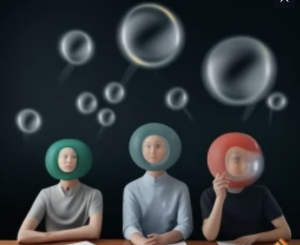When I first heard Eric Whitacre talk about his virtual choir and its debut on YouTube, a virtual choir and the power of crowds, I got the chills. First, I was chilled by the music, Lux Aurumque (light and gold), which is heartbreaking and captivating, and like all great music, has the power to connect us with our own divinity. But at the same time, my blood ran cold as if the virtual choir had injected me with a dose of vast isolation, and a great fear of what all this means to the human experience.
Eric Whitacre assembled a technological collage of sound and sight that is remarkable, but other than the fact that the project involves music and humans, it has almost nothing to do with the experience that takes place in an actual, real life choir. There is a magical and transcendent experience that happens when we come together as human beings to create music, side by side, heart to heart, an experience that Whitacre himself describes as the moment that changed his life, the first time he felt a part of something larger.
The magic and mystery of the experience is a result of living something together—co-creating and sharing an experience that unfolds before us, larger than us but containing us nonetheless. When we come together as individuals in a creative process, we become a part of the whole, our separateness melting into the experience itself, into one another, as we become vehicles for the universe to express itself through our seemingly separate embodiments. When our body experiences this, we are fundamentally changed.
When we omit the together part of the experience—when the process no longer happens together, is no longer shared, we cut out the key ingredient in the experience, entirely change its nature—extract its very soul. As I witnessed Whitacre conducting alone in front of a black screen, in silence, watched the singers’ faces float by in individual boxes—a mosaic of separate lives pieced together in the ether, creating the illusion of togetherness, I was certain that I would rather live connection than know that I had lived it. I wonder, is this what the future holds? It feels apocalyptic.
No matter how we try to recreate the experience of together in an end result, inserting it through a separated process, we simply cannot manufacture the experience of together. If we want to experience the profundity that being and creating together can offer, we must actually be and create together. Everything else is just an idea.
The virtual choir informs its participants that they have become part of something larger than themselves, that they were indeed connected. But in the experience of living it, they were alone and disconnected.
The experience of the virtual choir, to use Whitacre’s own words, is an expression of “Souls on their own desert islands sending electronic messages in bottles to each other.” I believe that Whitacre used this image to suggest a kind of optimism about humanity and our longing to connect. I did not find his analogy to be optimistic, nor do I see sending out electronic messages from my own desert island as an acceptable substitute for experiencing connection. To celebrate the virtual choir is to celebrate the end of the direct experience of connection, of living the actual experience we are talking about. It is to say that going forward, we agree to be nourished by the concept of connection—to let technology live fully, while we humans stand by and hear about it, delighting in our ability to re-create something that looks like real connection—and now actually calling it real.
In one particularly chilling testimonial, a singer writes about how wonderful the virtual choir was because she got to “sing with her sister.” A cultural amnesia is setting in, a forgetting of what direct experience actually is, what it feels like to have the experience itself. In truth, this young woman did not sing with her sister. She did not have the experience of singing together; her body’s cells do not contain the experience. She sang alone, as did her sister. What she lived was something entirely different; she had the experience of knowing that recordings of her and her sister’s voices were brought together in a technological feat. It looks and sounds like she and her sister were singing together and that simulation of reality, that notion of being together, is what she gets to take home as the experience itself. In place of the direct experience, she gets to have an idea of the experience—and here’s the terrifying part: she believes that they are the same thing.
“People will go to any lengths necessary to find and connect with each other. It doesn’t matter the technology,” says Whitacre. Yes, people are desperate for connection, but it does matter the technology. Technology is replacing the direct experience of connection with the concept and simulation of connection, and we humans are losing the capacity to tell the difference!
At one time, technology may have been intended to bring people together, to create actual connection, more time together, more personal experiences, a richer experience of life. Regardless of its original intention, it seems that the system has flipped on itself. People feel more disconnected, more like they are on their own desert islands, while technology gets to do all the connecting. We sit alone in our isolated pods, while the invisible wires and cables do the interacting—together. I fear that we are losing sight of what actual connection feels like, believing that our computers’ connections are our own. The more we congratulate ourselves on our ability to simulate the experience of being human, the more, little by little, the direct experience of being human slips away.
After listening to the virtual choir, I am left with a haunting echo, and I cannot help wonder if the haunting comes not only from the poignance of the music, but also from the poignance of what’s being lost, from the experience of virtual connection itself—the sound of humans singing alone into empty rooms, like lost birds calling out for their mothers to find them, to save them from the loneliness, and bring them home.



One Response
Herein lies the “trap” of technology. It promises and delivers the illusion of connectedness. We as human beings are terrified of being rejected, laughed at, or worse, ignored and the virtual community promises and unfortunately does deliver acceptance, no real judgment or possible criticism of who we are (after all we know it’s only virtual and not real). I don’t think our brains/heart/ or souls care, at least on the surface. It’s a calorie free meal (and we pretend not to notice or care that there is no nutrition either). It fills the hole, but is ultimately like the stereotypical meal of Chinese food…30 minutes later, HUNGRY AGAIN!!!